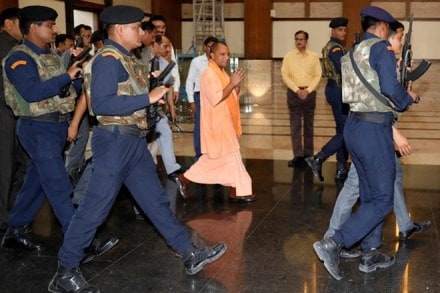The predominant economic thought in the country would dismiss the Rs 36,359-crore farm loan waiver announced by Yogi Adityanath government in Uttar Pradesh as “bad economics”. For years, we have been made to believe that markets can regulate themselves, take decisions rationally, and don’t require government intervention. Several economists have sought to apply the same philosophy to India’s agriculture, arguing the government should stop giving freebies (subsidies) to farmers and, of course, loan waiver is a complete no-no.
In an ideal situation, such argument may work. But economics cannot be just theories dreamt for an ideal condition. What the predominant thought process, which tends to consider everything including humans as inorganic components, misses while arguing for the free-markets is the fallacies of the human agent — sometimes forced by nature and sometimes by themselves.
The second missing point in the predominant thought process is the undermining of the significance of the government even as the markets need government, or else human fallacies would not take much time to convert marketplaces into jungleplaces. We cannot do away with the government, nor can we undermine its responsibility to empower citizens. Loan waiver to crores of farmers in Uttar Pradesh needs to be seen as one such empowering move.
31 मार्च, 2016 तक लघु व सीमान्त किसानों को जितना भी फसली ऋण दिया गया है, उसका 31 मार्च, 2017 को अचुकता अवशेष माफ करने का निर्णय। #Farmers pic.twitter.com/CxrlaPRnDM
— CM Office, GoUP (@CMOfficeUP) April 4, 2017
Yogi Adityanath Cabinet on Tuesday waived off loans worth Rs 30,729 crore of 2.15 crore small and marginalised farmers, who had taken a crop loan up to Rs 1 lakh each. Along with this, an additional Rs 5,630 crore was given to write-off NPAs of 7 lakh farmers of the state, taking the total farm loan waiver amount to Rs 36,359 crore.
It has been argued by some experts that the move is pure politics and very bad economics. They have argued that the move will inspire others to stop paying their dues to the banks, which will ultimately discourage the latter from issuing loans to farmers. However, there are two wrong assumptions in this argument: a) It considers that humans don’t like to fulfil their responsibilities. However, under no circumstances, we should undermine people’s, even if they are poor, commitment towards their responsibilities. Repaying loans is one such responsibility. b) In rural areas, people tend to opt for loans when there is no option. Most of the time people are fearful of the banks and no one wants to be harassed by them. There may be some exceptions, but exceptions don’t make the rule. It will be dangerous to discount the general goodness of people.
Those claiming that farm loan waiver is bad economics tend to treat agriculture at par with other industrial sectors. But then, considering agriculture as an industrial sector has its own pitfalls. For example: Farmers of the country do not get benefits at par with industrial workers. They have been a neglected lot for decades. Imagine the chaos that would ensue if farmers decide to go on a strike for even a single crop season. Loan waiver, hence, needs to be seen as a small contribution towards the agriculture workers.
Secondly, it also needs to be seen as a small one-time investment, or even as a bonus, for a vast section of society that keeps our kitchens running.
There is a saying in the market that you need to invest something to earn something. And, investments don’t always have to be on physical infrastructure only. Sometimes the government, even industries, need to invest in human capital for better results. Haven’t you heard that companies that take care of their employees well tend to achieve new heights of success recurringly?
With Yogi and Modi government’s declared commitment to empowering the farmers by full crop insurance and full crop procurement, one can believe, the loan waiver will act as a stimulus for farmers to work more and produce more for the country.
